Spotlight on Dietitian Speaker Toni Toledo
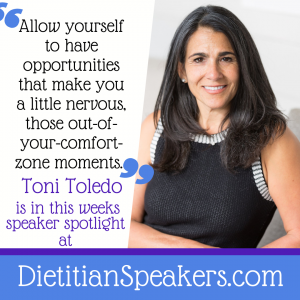
AC: Let’s start with how you got started speaking and how speaking fits into your career now.
TT: This is a fun question to think about, because how often do you stop and say to yourself, “Where did this begin?” So, thank you.
I feel like I’ve been speaking in front of people forever. I think it all started in my early years as a dietitian. I was teaching groups, and then the groups got bigger, and then in grad school, it was presenting research and presenting at conferences and teaching in guest lectures and things like that.
Your question also makes me realize how things weave together that sometimes seem like disparate parts. My day-to-day job is direct service teaching classes, so I’m always in front of people speaking. As of the last five or so years, it’s become its own animal and morphed into different forms.
I have a couple of other ways I speak; one big chunk of my work is training dietitians with the CDR Adult Weight Management Program. That’s stepping in front of hundreds of people and speaking and training and a combination of podium-type stuff and one-on-one small group projects. Then lately because my fun passion project is my podcast, The Path Pod, I’ve been speaking at length in front of all kinds of people about podcasting.
So one part is very much in the field and driven by all the tenets of nutrition, behavior change and all those little things that light my fire as a dietitian. Then the other part of the time I flip the hat around and I’m talking about the logistics of podcasting, trying to inspire other dietitians to get their voices out there and begin podcasting. It’s an interesting combination.
The ball started rolling and with these bigger side projects that have now become their own entities, it leveled up time and time again. Now that I have the luxury of looking back, it’s like these little pieces started being put together as a younger career person, as a younger woman and dietitian. And now, I just spoke last week in front of probably five hundred and thirty people virtually. It’s been this creeping growth process that has changed not only who I’m in front of, which is one thing, but who I am as that person in front of all those people. My skills and confidence and all of that have slowly been growing on that journey to the quote unquote, larger audience.
AC: How did The Path Pod get started?
TT: So it was my 50th birthday, some friends had flown in from out of town, one of them being my bestie, who’s a dietitian who lives in Columbus. We were lamenting that we just couldn’t get enough positive messages out there about health, we felt like you hear all the doom and gloom, and how hard it is to be healthy. We thought, Well, why not us? Why don’t we put our voices out there and be a conduit of all these great things that are going on that are positive things that people are doing for health. We could be the people that spotlight what’s out there.
It began as sort of this virtual little road trip to say, Hey, this information or resources are siloed in this state or in this country and other people don’t know about it. Let’s shine a light on it and make sure people know that these things exist so they themselves could be healthier, and maybe their families or their communities, like building a huge toolbox. It has grown over time into this little engine that could and just keeps growing and connecting and has a little life of its own now.
AC: That’s awesome! I think the podcast platforms been growing a lot over the past couple of years, so it’s a good time to be there.
TT: Oh, man, one hundred percent. It’s ironic because I had no intentions of podcasting. I mean, I love to listen to podcasts. I’m happy to have them in my ears and grow and learn from them, but I never had it on a bucket list. I was kind of reluctant to podcast because I don’t like my own voice, so why would other people want to hear it? And now, fast forward, yesterday we uploaded our seventy-ninth episode. It’s awesome, this complete joy in my career that never was on the radar!
AC: I can hear the excitement in your voice, it’s inspiring. Let’s switch gears now and talk about making money. Did you have a transition from speaking for free to asking to be paid? And was it challenging for you?
TT: Yes, it was, and I think that being in this field, we care, and we want to help and that always seems to show up first. Sometimes it’s just a wonderful, generous thing and sometimes it can be a hindrance because we maybe don’t see ourselves as business people or understand the value of what we have. I would just want to share and shout from the rooftops what I knew and how could this help other people?
I didn’t think about the money side of things, and what it took – and this is a little embarrassing – it took somebody offering to pay me first. Then I said to myself, Wait a second. I should be expecting this. I mean, not in a demanding way, but this has a value, and I’m worth it. After that passive form of payment, when someone offered me a stipend or an honorarium, the light bulb went off and I realized getting paid is rational and reasonable. So between that and then working with the CDR weight management team, my brain started to shift to think, We’re getting paid and paid fairly and we are giving a great product. It was at times a slightly uncomfortable component, but that’s the muscle I’m building and I think I’m getting there.
AC: I can imagine that change is a little scary at first. Do you have any advice for a dietitian who’s feeling insecure about expecting to be paid to speak and just starting out?
TT: Yeah, I think at the end of the day, a little soul searching is always a good idea.
For example, I think about what we put into this degree and the rigor of becoming a dietitian. And I think sometimes we forget our worth and we forget that we are experts. I think we tend to have a little imposter syndrome sometimes and think, Oh, I’m not sure I’m worthy.
We have to remember that we have this amazing, sound foundation of skills and knowledge, and that it can be tricky, but to tolerate that uncomfortable feeling initially and have the conversation. Knowing sometimes someone’s going to say, Yeah, I wish I could pay you, but I can’t. And maybe look to the other benefits that you would get. Having that sometimes uncomfortable conversation where you show up to the table and you ask the question and you see what the funds are and what the budget is and get familiar with the terminology so that those conversations become more natural and viable. Being able to tolerate the discomfort of initially going into that payment world.
Also, I have to say, Jessica’s book [A Dietitian’s Guide to Professional Speaking] is a great resource to help you think through value and payment and the vast spectrum of what benefits are there to speaking, whether it’s monetary or otherwise, and get to that point where you’re saying, I would like to be paid X amount of money for this service.
AC: Great points. I’m glad you mentioned imposter syndrome as well, because that’s something that I hear about often, especially within this field, which can affect asking to be paid for speaking as well.
TT: I feel like imposter syndrome during the pandemic has become something we’re more comfortable talking about. I think being isolated, has exacerbated the issues around imposter syndrome. We need to step back and say, hold on a minute, why are these feelings here? What can I do about them? And then those practical tools for contending with imposter syndrome and thinking about the community of nutrition professionals and how we can help each other overcome it by providing perspective and cheering each other on. Those things can make a gigantic difference for someone at one point and then they may turn around and help you someday.
AC: I love the idea of supporting each other as a community. That’s really what DietitianSpeakers.com is all about, so thank you for being part of that movement to cheer each other on. Now tell us what qualities you admire in an excellent speaker when you’re in the audience.
TT: OK, so sitting there, the thing I love is when I’m first drawn in… I’m a huge story junkie, so give me some story. Whether it’s a question at the beginning or some sort of hook to bring us into the same space, I love it when someone is just real and shows their true colors and they disarm you, where you feel part of it and comfortable.
Confidence plays a role, when the person standing up there feels good about what they’re talking about and owns it… not in a snooty, “I’m the best” way, but an “I’m safe in my skin and here’s what I must share.” Passion is a big win for me in a speaker. Sense of humor is huge, too, to add in some levity to this collective experience we’re having together. Those are biggies for me, especially passion, involvement and a clear message. All those things are high on my list.
AC: Transformative qualities for a speaker to bring to the audience. Yes. Have you ever been involved in a presentation as a speaker where it all came together like that?
TT: Oh, wow. Yeah, I just had a really incredible experience with three other podcast women dietitians that I have a lot of respect for. I mean, women that I’ve looked to for a long time, who I see as sort of the OG of podcasting, and I was invited to speak as part of a panel with them. Here we were scattered across the world… one was in Australia and the rest of us were peppered across the U.S. The planning process for it was intense, trying to organize all this information, material and structure. It was so collaborative and there were no egos involved at all. Everyone pulled together. I called it the dream team because it was just pure collaboration and unity. We spoke virtually, of course, again, from all of our homes across the world, but I felt like I was in the room with them. I felt like we symbolically had our arms locked. It was just this incredible connection. Everyone showed up and appreciated and respected each other, and the feedback we got from the virtual audience was so reinforcing and it just made me realize that anything’s possible even in this kooky virtual world. We can do something like this that is impactful and powerful and collaborative. And, you know, it’s something that two years ago would never have existed.
AC: Although it has been as hard as it has been, it seems there have been some silver linings from this past year for the virtual speaking community. What about glitches? People love to read about when things go wrong and how you get through it as a speaker.
TT: So I’ll share a little kooky story that could have been a complete disaster and yet served as an interesting pivot point in my life as a speaker. It was during one of the adult weight management certificate training sessions. We had a huge group of people, maybe two hundred and fifty people, and a few of us were taking turns speaking on the panel when suddenly there was a fire alarm and everyone had to evacuate. No one really knew what was going on and you could imagine it was chaos and a bit of mayhem and there were some fears and whatnot, but it was incredible that everyone kept their cool. For the most part, we all got shunted outside to safety.
The cool part is that during that 20 minutes or so where we were all displaced, it went from a room of two hundred plus attendees and trainers into a very human moment where everyone sort of melded together and we all chatted and touched base. I remember standing outside thinking I was nervous about my time to talk coming up, and I had my little butterflies, and I remember thinking, this is humanity!
It really shifted my perspective from feeling like I needed to do it all perfectly and button up everything, to wait a minute, we just had a human moment together. At the end of the day, that’s who we are, humans. It gave me this interesting shift in my brain, which was very valuable. At the end of the day, I’m looking out at people who are looking back at me as a person, and that connection forged and it’s helped me in other speaking engagements when I hearken back to that moment.
AC: Amazing. Can you elaborate on how reflecting on that moment helps you now?
TT: Sure. I use it as something I keep on a shelf in my brain, and I try to access that memory when I do get nervous and start to feel a little wound up, almost like a little coaching moment for myself. It’s a tool now. I think I will forever have my little jitters and whatnot but this takes the edge off.
AC: Any other personal growth or speaker growth lessons you wish you had known sooner?
TT: Yes. If I could go back in a time machine and talk to Toni at 20, I would tell her, Toss your hat in the ring sooner! Don’t wait to be fully formed, so to speak. Allow yourself to get in the ring and work with people and have these opportunities that do make you a little nervous, those out-of-your-comfort-zone moments. Collaborate with people and partner with people and volunteer more and all of those things that give you these opportunities to speak.
What I’ve learned overall is that only I have my take on this material and this field, and what I bring to the table is unique. So ultimately, you have to be yourself and also be ready to absorb and learn and adapt and challenge yourself early on. I think I waited for the sign to go off that I was ready… like a little bell that never rang. I realize now I could have had even more of these awesome experiences had I allowed myself to go out there sooner.
AC: Wow, thank you for sharing that. Anything else you’d like to add?
TT: Just that this has been so fun to step back and think about this area of my life and how it has been an evolution. It gets me excited about where I’m heading. It’s such a learning experience to be a speaker, and it’s a privilege. I’ll keep counting my blessings and keep on going because it’s all part of my lifelong journey of learning and growing and actualizing. Sometimes I forget that journey has an impact on people around me – aside from information I’m sharing, but also the act of standing there in front and being that speaker may encourage someone else to say, I can do that, too.
AC: Thank you Toni for sharing that. I’m glad this helped you look back and say, hey, this is how far I’ve come. And I can assure you that it definitely will help someone reading this with their confidence, too.
Listen to Toni’s podcast at thepathpod.com
Follow Toni on social media: LinkedIn @ToniToledo and Instagram @thepathpod.

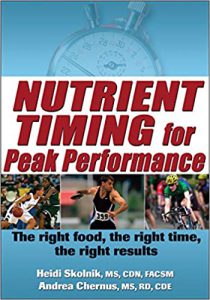
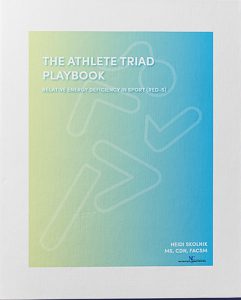
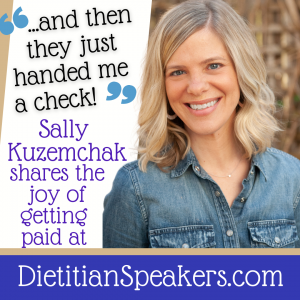
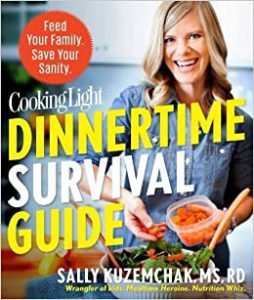
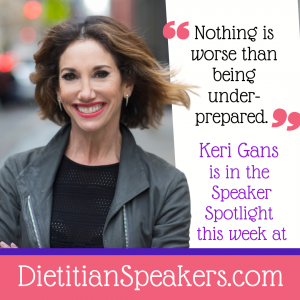
 Talking with Deanna Seagrave-Daly about her speaking career is like drinking from a fire hose – her ideas and strategies bubble up and out in a fountain of enthusiasm. Read on as she shares her best tips with DietitianSpeakingGuide.
Talking with Deanna Seagrave-Daly about her speaking career is like drinking from a fire hose – her ideas and strategies bubble up and out in a fountain of enthusiasm. Read on as she shares her best tips with DietitianSpeakingGuide.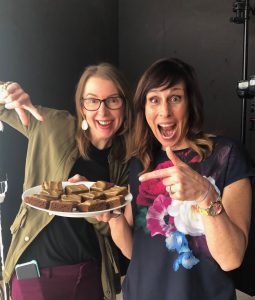
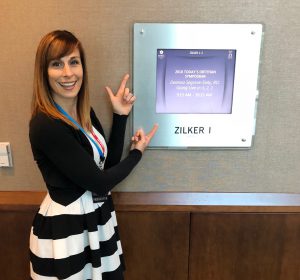 DSG: That’s such a cool way to maximize your opportunities – speak on something you’re passionate about and help a product you believe in get more publicity.
DSG: That’s such a cool way to maximize your opportunities – speak on something you’re passionate about and help a product you believe in get more publicity.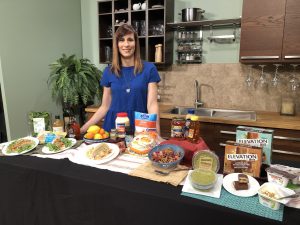
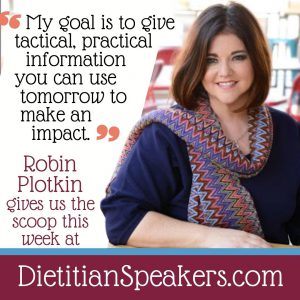
 Alex Caspero is a Dietitian Speaker who knows how to pivot. From growing her speaking niche to adapting to covid life, read on for her take on professional speaking and why it’s good to feel uncomfortable.
Alex Caspero is a Dietitian Speaker who knows how to pivot. From growing her speaking niche to adapting to covid life, read on for her take on professional speaking and why it’s good to feel uncomfortable. Leslie Bonci has a signature style that’s easy to spot: she hits home-runs with her puns and rhymes at the right times. Read on as she shares her favorite speaking topics and tips with DietitianSpeakingGuide.com.
Leslie Bonci has a signature style that’s easy to spot: she hits home-runs with her puns and rhymes at the right times. Read on as she shares her favorite speaking topics and tips with DietitianSpeakingGuide.com.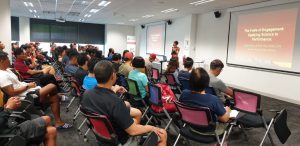
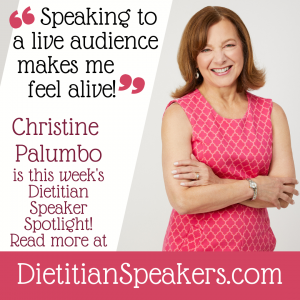
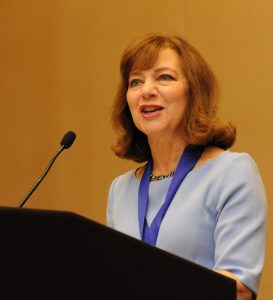
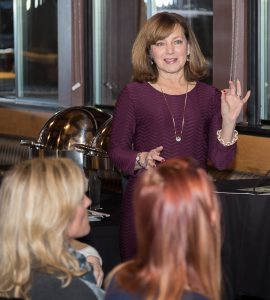 DSG: Wow. As Jessica says, evaluations often reflect more about the writer than the presentation, and the negative ones really stick in your mind. Let’s end on a positive note – what’s your favorite compliment?
DSG: Wow. As Jessica says, evaluations often reflect more about the writer than the presentation, and the negative ones really stick in your mind. Let’s end on a positive note – what’s your favorite compliment?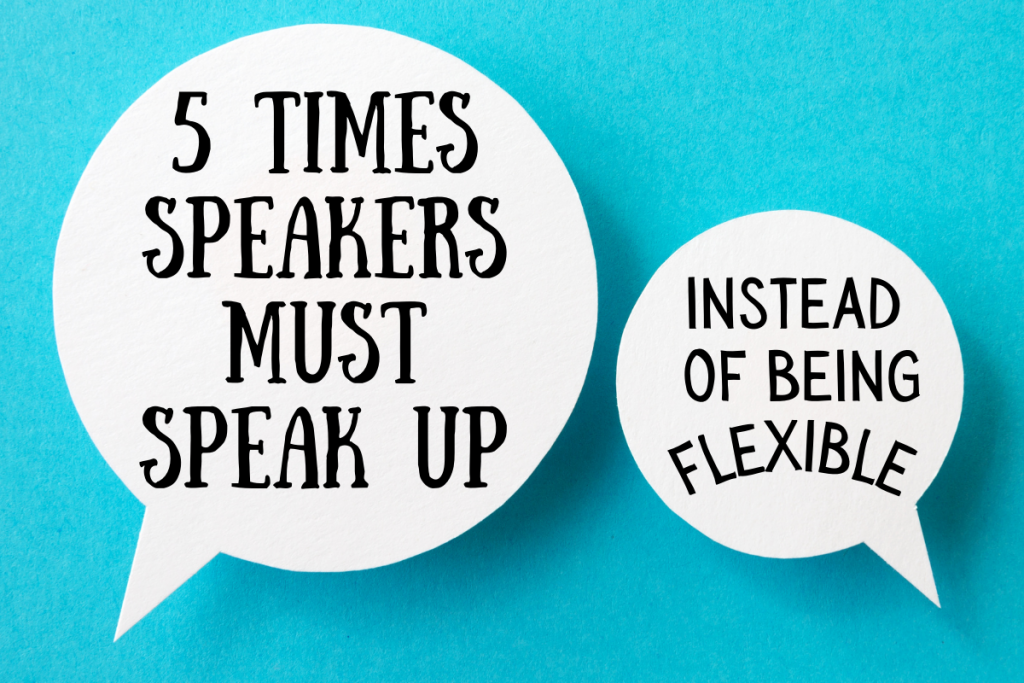
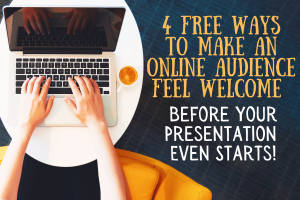 If you thrive on the excitement of public speaking, presenting online can feel impersonal and even lonely.
If you thrive on the excitement of public speaking, presenting online can feel impersonal and even lonely.